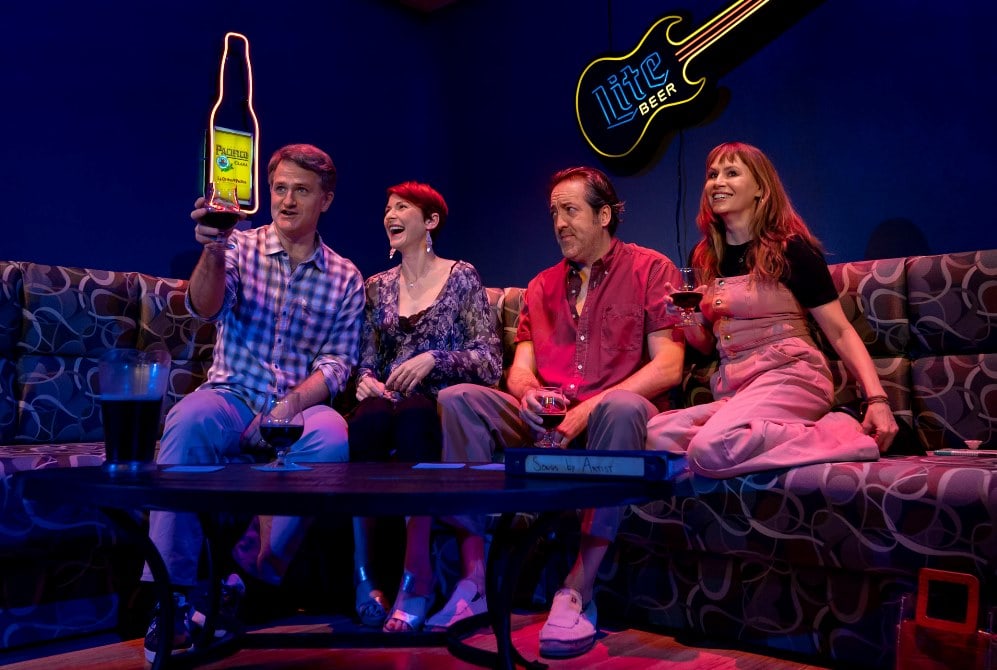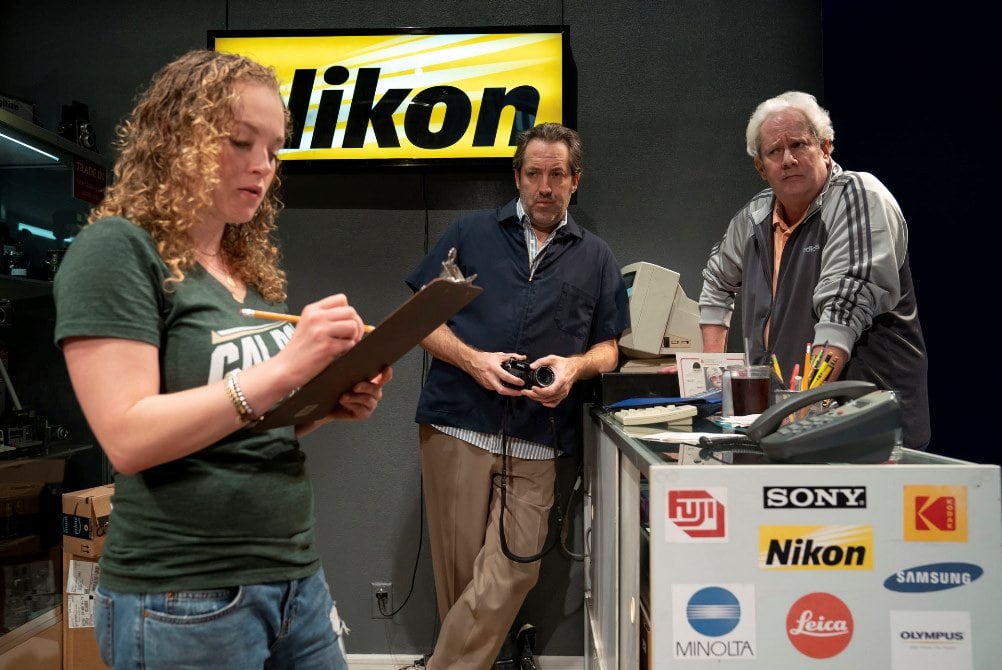A male mid-life crisis, a deadbeat dad, sexual harassment in the workplace, the objectification of women, callous philandering, and every other conceivable manifestation of toxic masculinity and ‘manopause’ are the themes of Tracy Letts’ Linda Vista. So if you’re not seeing more than enough of that in your daily newsfeed, you can check out the prize-winning playwright’s sardonic exploration of the subject in Second Stage Theater’s transfer of the world-premiere Steppenwolf production, now playing a limited engagement at Broadway‘s Helen Hayes Theater.
The 50-year-old Wheeler (he chooses not to go by his first name “Dick,” though it suits his personality to a tee) is the epitome of a man behaving badly – a foul-mouthed, acerbic, opinionated misanthrope, whose incessant jibes at the world and simultaneously self-deprecating and know-it-all comments bespeak the unbridled force of his testosterone-driven behavior. In the midst of a nasty divorce from his wife, estrangement from his 13-year-old son, move from a cot in her garage to his own apartment, and underemployment as a repairman in a camera shop (rather than the respected photographer he once was), he reconnects with old friends and re-enters the dating pool with (not unexpectedly) decades-younger women. How do you suppose that goes?

While the dark comedy requires some suspension of your disbelief (it’s a stretch to imagine the unlikely premise that these willing bedmates – even though flawed and damaged from their own past experiences – would be attracted to this self-described “loser,” whose attempts at his idea of romance have generally ended with “and he was humiliated”), it does deliver a constant barrage of laugh-out-loud one-liners and risible conversations in a style reminiscent of a TV sit-com. Those are interspersed with provocative philosophical ponderings on life, death, and relationships, and running metaphors about photography and a rapidly deteriorating hip, which add some weight to Wheeler’s journey.
Letts’ story, under the dauntless direction of Dexter Bullard, also includes extended fully nude and graphic simulated sex scenes that make us wonder if these are truly about characters being open and vulnerable during episodes of intercourse cum discourse, or just indicative of an old wolf gratuitously getting off on naked younger women and reveling in self-satisfying non-committal sex (note the total absence of tender foreplay or sweet post-coital cuddling). It also makes one question if such content is really intended for “mature” “adult” audiences, or fixated adolescents. Either way, he is exposed.
Ian Barford turns in a revelatory performance as Wheeler, capturing his dysfunctional life, biting wit, unlikable attitudes, and ungraceful aging with no-holds-barred intensity. He is a study in flagrant emotional meltdown, incessant self-sabotage, and psychological subterfuge, unwilling to listen or to learn from his never-ending mistakes and repeated actions, but quick to crack a disparaging joke, to make excuses, to place the blame, to cry, to beg, and to offer insincere apologies in a desperate effort to get what he wants. His spot-on characterization, underscored by his bitter and scornful facial expressions, is at once laughable and infuriating.

The featured cast lends fine support in delivering the cynical humor, mocking portrayals, and underlying message of the show. Jim True-Frost plays a familiar Everyman as Wheeler’s old pal Paul, who helps him and is there for him, engages with him in salacious guy-talk, arranges a double-date with a 30-something friend, gives him hilariously circumspect advice, and leads a generally uninspired life with his wife Margaret – a former girlfriend of Wheeler’s, who doesn’t hesitate to call out his choices, in a funny and feisty performance by Sally Murphy. As his blind-date and month-long partner Jules – an overly upbeat “life coach” with a degree in “Happiness” and some unhappy issues of her own – Cora Vander Broek inhabits the woman’s transition from an unhealthy quick attachment to the self-absorbed Wheeler to an empowered recognition of the pain he causes (garnering cheers from the feminist members of the audience). Chantal Thuy is equally effective as Minnie, the intriguing 26-year-old Vietnamese-American Rockabilly neighbor in his apartment building, with whom he forges an unlikely bond and tries (but fails miserably!) to recapture his distant youth, obsessing over her and donning ridiculously age-inappropriate clothing. And Troy West as Michael – the creepy, lonely, possibly suicidal older proprietor of the camera shop – provides a prophetic look at what lies ahead for Wheeler if he doesn’t make the necessary changes in his life and his conduct. Will he? Or will he fall back into the same old misogynist patterns with his co-worker Anita, portrayed with just the right tone of ambivalence by Caroline Neff, whose mercurial opinion of him leaves us to wonder if she, too, will fall prey to his usual habits.
Todd Rosenthal’s rotating set and background projections provide a sharp contrast between the modest monochromatic apartment and store, where Wheeler lives and works, and the appealing cityscape of San Diego, with its lush palm trees, refreshing waters, and colorful sky – offering a beautiful view (the titular “Linda Vista”) outside, but not so great within. Laura Bauer’s costumes accurately define the characters, and Richard Woodbury’s sound design incorporates the rock-and-roll hits of Wheeler’s youth in the ‘70s and ‘80s, evoking feelings of nostalgia for his younger days.
With a running time of two-and-a-half hours, the questionable behavior and morals of Letts’ characters become a bit tedious and redundant; the narrative could benefit from some trimming to keep the laughs, and the inherent punches, flying. But if you can see the humor in the challenging situations women, like Anita, “manage some version of . . . every day,” then you might enjoy their brutally comic exposé in Linda Vista.
Running Time: Approximately two hours and 30 minutes, including an intermission.





